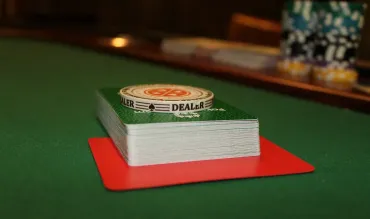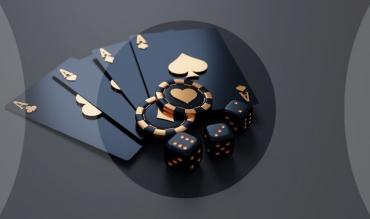So you want to know how to play Caribbean Stud Poker - or even want to know what Caribbean Stud Poker is! Rest assured, we’ve got you covered. Here you will learn the basics of how to play Caribbean Poker and the bottom line strategy. (But no, we can’t tell you if and when you’re going to hit that juicy progressive jackpot – we don’t have a magic crystal ball!)
Caribbean Stud Poker: A Beginner’s Guide to the Basics
The first thing you need to know is that this isn’t your typical poker game – it’s not a bunch of guys with cards sitting around the kitchen table. You don’t need multiple players. Your opponent is the dealer.
Unlike most traditional poker variants where you need to desperately scroll through your old Facebook contacts in order to find enough people to get a game running, Caribbean Poker is an individual pursuit. Like video poker, it’s you against the house. Man vs. machine. (Or woman!)

Caribbean Stud Poker is a casino game with rules derived from Five Card Stud poker. Here are some key points about Caribbean Poker strategy:
- No bluffing
- No multiple rounds of betting
- No poker face required
Again, since this is a single-player game like video poker against a machine, you don’t have to worry about giving off tells. Even online Texas HoldEm against real players means you have to be aware of your timing and how long it takes you to make a decision (a.k.a. “timing tells”). Caribbean Stud Poker is much more simple and less stressful. You don’t need to remain stone-faced or robotically balanced as part of your winning strategy.
Don’t confuse Caribbean Poker with the more complicated poker games like No Limit Texas Hold ‘Em (NLHE) or Pot Limit Omaha (PLO). This game is about sitting back, relaxing, and hoping you beat the dealer and maybe even bink a jackpot (wouldn’t that be nice?)
The Origin Story of Caribbean Stud Poker
Despite being a relatively new game, it's unclear how or where exactly Caribbean Stud Poker began.
David Sklansky, famed author of various poker books like Tournament Poker for Advanced Players, claims to have created this game in 1982 under the name "Casino Poker.”
However, when he developed the game, it had two major differences:
- The dealer revealed two of their cards instead of just one.
- There was no progressive jackpot – various casinos introduced this afterward. The casinos wanted to merge the popularity of poker with the accessibility of table games.
Sklansky says he wasn’t able to patent Casino Poker, thus cannot verify it as his invention. Nevertheless, years later a player introduced the game to a casino in Aruba. This player informed Sklansky that he had obtained a patent after changing some rules and renaming it “Caribbean Stud Poker."
Step-by-Step: How to Play Caribbean Stud Poker
If you've ever played Five-Card Stud, you have virtually all the knowledge you need to play Caribbean Poker. The rules are simple and easy to learn quickly. Just remember these three things:
- Bluffing is non-existent.
- There are no draws.
- Despite being seated with other players at the table, we only play against the house.
Now let’s get started. The dealer will deal five cards face down to each player who has placed the initial bet (also called the ante) on the table.
Next, the dealer will deal themselves five cards but we can only see one. So FOUR cards are face down and ONE is face up.
Once the dealer's card is revealed, we can look at our five cards and decide whether or not we should continue in the hand. This is where the Caribbean Stud Poker strategy comes in, and you need to know the mechanics of how to play.
If we want to continue, we must make an additional bet of twice the value of the ante. Here’s an example. With an ante of $10, the bet must be $20.
If we don't want to play, we can simply fold and only lose the ante (in this case, $10). Much like other forms of poker, decisions are cumulative. Caribbean Poker Stud strategy isn’t about NLHE or PLO poker skills such as preflop card selection, check-raising, reraising, bluffing, etc.
The main Caribbean Poker Stud strategy is knowing when to continue or let go of your hand. In this case, is your hand worth another $20? Let’s keep going so you have more information to make your decision.
When the betting or folding round ends, the dealer will reveal his hand.
IMPORTANT: Even though there may be other players at the table, your hand only needs to beat the dealer's! You do not need to have a better hand than any of your fellow tablemates.
If the dealer's hand qualifies and beats yours, you lose the ante and the bet.
If the dealer's hand qualifies but loses to yours, you will receive an amount equal to your ante and an amount equal to or X times your bet. The strength of your hand determines the amount.
If the dealer's hand doesn't qualify, all players who bet will receive an amount equal to their ante, and they get their bets back.
Thus, Caribbean Poker strategy all comes down to this: Do you think you can beat the dealer’s hand? If yes, stay and play. If no, fold and wait until the next hand.
Understanding Caribbean Stud Poker Payouts
The following table presents the amounts paid by the house based on the strength of the player's hand in play. This table might differ depending on the country/location.
But for simplicity’s sake, we will present the American version:
| HAND | PAYOUT |
|---|---|
| Royal flush | 100 to 1 |
| Straight flush | 50 to 1 |
| Quads | 20 to 1 |
| Full house | 7 to 1 |
| Flush | 5 to 1 |
| Straight | 4 to 1 |
| Three of a kind | 3 to 1 |
| Two pair | 2 to 1 |
| Pair or high card | 1 to 1 |
When Does the Dealer Qualify in Caribbean Stud Poker?
The dealer only qualifies to play based on the following:
- Their hand either contains an Ace and a King.
- Their hand forms a pair.
- They hold any higher-ranked poker hand.
So, if the dealer has anything worse than A-K-4-3-2, they do not qualify to play. If the dealer has worse than A-K-4-3-2, the house pays the value of the ante to all players who placed bets.
Exploring the Progressive Jackpot
But you wouldn’t think we’d leave it at just that, would you? No! We need to make it a little more fun. Caribbean Stud Jackpot, anyone?
In most casinos, there's also a progressive jackpot in play. It is possible to win a portion or even the entire amount.

For this to happen, we must place a fixed bet solely dedicated to the jackpot before seeing any cards. Who doesn’t love a good jackpot bet? Budget accordingly if you like to incorporate a progressive jackpot gamble. But it definitely is a gamble – more on this in the next section.)
Typically, American casinos payout as follows:
| HAND | PAYMENT |
|---|---|
| Royal flush | 100% of the progressive jackpot |
| Straight flush | 10% of the progressive jackpot |
| Quads | $500 |
| Full House | $100 |
| Flush | $50 |
IMPORTANT INFORMATION ALERT No. 2: You don't need to beat the dealer's hand to win the progressive jackpot!
That’s right – if you form one of the hands from the table above, you will immediately receive the corresponding amount. Even if the dealer has a higher hand than yours.
Typically, the bet to play the progressive jackpot is $1.
Advanced Tips for Winning at Caribbean Poker
As with all casino table games, you’re going to need to get a little lucky – it's essential to clarify that this poker variant is still a game where the house has an edge of about 5%.
However, by studying and applying optimal strategy, it's possible to reduce the casino's edge to around 1%. Those odds are similar to blackjack.
Considering that there's only one decision to make in each hand (raise or fold), mastering this game will be done in a short amount of time.
There are just two basic fundamentals you need to know and consistently apply:
- Always play any hand with a pair or better.
- Always fold any hand weaker than A-K-x-x-x.
Bingo! Keep this as your Caribbean Stud Poker Strategy cheat sheet (you’re welcome). By applying these two rules, there's only one hand that we need to analyze and discuss: Ace-King (AK).
If you receive AK and the dealer's upcard is a Queen or lower, and you have a card of the same value, raise.
If the dealer shows an Ace or a King, continue in the hand only if you have a Queen or a Jack, i.e. A-K-Q-J-x.
If you have a Queen and the dealer's upcard is lower than your fourth highest card, bet (For example, you have A-K-Q-8-4, and the dealer is showing a 6).
Now if you’re playing to completely maximize skill edge and can resist the allure of a progressive jackpot, experts will advise you to pass on that bet. Like any progressive jackpot, they’re hard to hit. The Caribbean Stud Poker jackpot is no exception.
Even though there are five jackpot hand opportunities, the probability of forming one of these five combinations is so low you'll likely never win enough to be consistently profitable.
That's why you shouldn’t play the progressive jackpot if you intend to minimize the casino's advantage in Caribbean Stud Poker.
But if your goal is to try your luck, then by all means, please play the jackpot! Casino games like these can definitely be optimized to reduce risk but they can’t be solved. There are better ways to play but not perfect ways to play.
So, yes, if your only concern is giving yourself the best possible odds of winning then avoid the Caribbean Stud jackpot. That being said, it’s a gamble against the house no matter what way you play. Bet the jackpot if you feel it coming! These activities are meant for fast fun, not long-term profit. It’s a game. Not a job.
Why Caribbean Stud Poker is Perfect for Casual Players
Caribbean Stud offers a uniquely simplified poker experience – making it an ideal choice for those seeking a casual and less intense casino game.
Unlike traditional poker variants, Caribbean Stud Poker is an individual pursuit, pitting the player against the house in a relaxed and stress-free environment. The game's charm is in its single-player format, absence of bluffing, and straightforward decision-making process.
While luck is a factor, optimal strategy can reduce the casino's edge, making Caribbean Stud a game with a certain degree of skill as well. The two fundamental rules – always play a pair or better, and always fold a hand weaker than A-K-x-x-x – serve as a reliable Caribbean Stud Strategy cheat sheet. Progressive jackpots have their appeal, but proceed with caution.
Now may you sip Mai Tais and spike jackpots in Aruba.


